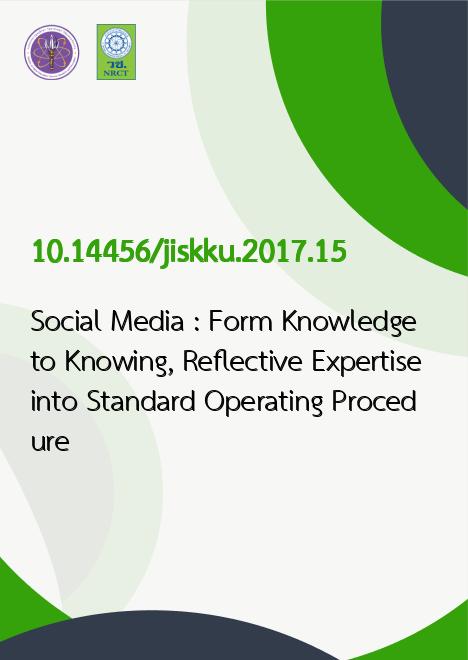
|
Social Media : Form Knowledge to Knowing, Reflective Expertise into Standard Operating Procedure |
|---|---|
| รหัสดีโอไอ | |
| Creator | Suphaphon Sorasittirat |
| Title | Social Media : Form Knowledge to Knowing, Reflective Expertise into Standard Operating Procedure |
| Contributor | Onjaree Natakuatoong, Theeravadee Thangkabutra |
| Publisher | Klungnana Vitthaya Press |
| Publication Year | 2560 |
| Journal Title | Journal of Information Science |
| Journal Vol. | 35 |
| Journal No. | 3 |
| Page no. | 56-87 |
| Keyword | Social Media, Knowledge Management, Expertise |
| URL Website | https://www.tci-thaijo.org/index.php/jiskku/index |
| Website title | Journal of Information Science |
| ISSN | 22288457 |
| Abstract | The purpose of this research aims to developknowledge management modelsfor networked communities of professionals using social media to enhance expertise competency of civil officers. This research was divided into 2 phases: (1)Social Media Behavior Survey, sampling 385 civil officers, using multi-stage samplingand collecting data by questionnaire, and analyzing data by frequency, and percentage.(2) Constructing the model, validated by 5 experts, using purposive sampling, andcollecting data by open-end questionnaire,then the findings were used to improveas draw to concept model.Results show that(1) there will alsosocial media behavior of civil officerstend to be Time: civil officers' experiences in social media more than 4 years,visit social media less than 10 times per day, average time spent on social mediais 30 minutes -1 hour, and 8.01 p.m.-0.00 a.m. is period of the most time spent onsocial media.Place & Device, popular place and device using social media arehome and smartphone, popular social media is Line. And Reason & Usage, civilofficers writing on social media 1-2 times per month, and mostly use alphabet forcommunication and chatting in chatroom, and reason for using social media iscontains new and modern knowledge and (2) The result of the model consisted oftwo main partsthe component of model: personnel, processes, technologies,networks, and professionalscommunity culture, the steps of model: orientation,workshop, KM Manually, KM One-to-Many, KM Dyad, KM Group and KMEvaluation. |